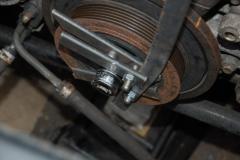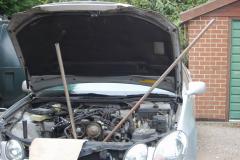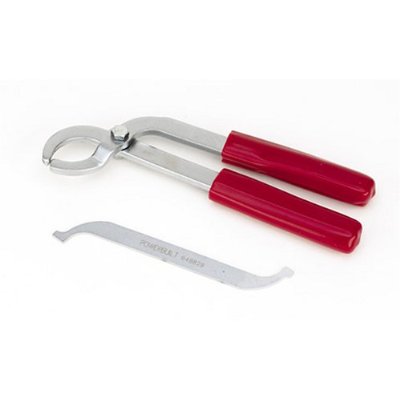
Simon12
Members-
Posts
17 -
Joined
-
Last visited
Profile Information
-
Lexus Model
GS300 Sport
Simon12's Achievements
-
Hi All, I've done various searches and found a lot of disparate threads on this issue and several seem to be left kind of unfinished as to what the cause was. Therefore, I thought it might be useful to consolidate what I've found and check if it's correct and complete. If not, perhaps you could add your pennies worth? Partly, this has been motivated by the fact that I experienced multi-layered knocking that once I solved one problem, another one was heard and it's a bit of a running story atm! (one of the problems was never properly addressed or solved by Lexus servicing either) So, if you experience knocking coming from the front end, in the approximately the following order check: 1. ball joints and replace as necessary 2. brake caliper pins are sliding correctly, grease and service appropriately 3. lower and upper suspension arm bushes 4. play in anti-roll bar bushes and assembly (makes more of a rattle over uneven surface) 5. shocks Does that just about cover it, or is there anything I've missed? And would it be helpful to have some guide as to how to check these things at home? Cheers, Simon
-
It is a DIY job but you will most likely need either a long breaker bar or an pneumatic impact gun to remove the nut and whatever you do, make sure you get a good quality ball-joint splitter. When I did the job I broke three splitters that I'd bought down at my local car parts place! Good luck!
-
Hello Sunny, In my experience, it's a fairly straight forward job mechanically. It's the undoing of the crankshaft nut that's the challenge! These are the extension bar lengths I ended up using to get the thing off when I did it: A holding tool is easy to make up as you have two threaded holes in the crank for m8 bolts. This is a photo of the holding tool I threw together (notice the bent lever showing how well set the nut is): As you're doing the job, you may as well also changed the accessory belt and spark plugs - perhaps even check valve lash if you're so inclined as they're supposed to be all part of the same 64k service. Hope this helps, Simon
-
Butting in a long time after this thread opened but I'm not sure this thread is a bit unfair in its generalisation across all lpg conversions being a no no. There are a couple of reasons. The first is down to the lpg system and installation. It's pretty well known that these cars need to have a valve lube system fitted otherwise premature valve seat regression can happen. Second, the valve lube system needs attention as it can clog up thus reduced flow to the valves can also happen - I suggest checking this flow regularly and sometimes flushing out the delivery system. Additionally, there are some poor systems out there that really don't work very well but there are some very good ones. With regard to the lpg system being blamed for multiple problems and the valves, it may not necessarily be the case. I am aware that the Lexus engines, the GS in particularly, require the valve lash to be checked and replaced at regular intervals (64k on the mkII GS). I'm also aware that Lexus dealerships do not as a matter of course always check them as part of this service because it is time consuming and expensive (it's a pain basically). When I ordered new valve shims at Lexus they asked if I had a burnt valve because it's only when there's a serious problem or noise they normally check them (worrying huh? - they didn't know it had lpg either so it obviously happens with non-conversions). Valves will regress as part of normal usage and this will eventually cause valves to burn out - especially the exhaust valves because they get hotter and the less the lash the less time they have to cool by transfer of heat to the cylinder head. My own GS needed about 8 replacement valve shims at a bit over 128k but that can't be blamed on LPG alone. 2 valves at this service were at zero lash and further driving would have caused a burnt valve on petrol or lpg - eventually. Coolant leakage that is assumed to be the cylinder head may actually be caused by the lpg cooling system that is taken from the oem system. I had two leaks in my system after a couple of years driving that caused some confusion but only needed a tightening up of some connectors on the lpg system - the lost coolant was dropping onto the exhaust and evaporating hence couldn't be located easily. I can't speak for all lpg systems but typically one would expect the lpg system ecu is simply a piggy-back ecu taking most data through the oem ecu - for example, the lpg injector pulses based on the petrol injector pulses by the oem ecu. Some lpg systems however will have some of their own sensors such as a map (manifold absolute pressure) sensor and others but where they can they use oem signals as it's easier. I would caution blame on the lpg system causing cold starting difficulties as they often don't cut in until the engine has reached a certain temperature and therefore I would first look at the OBD data from the car's oem sensors as this could be more likely - often it could just be a faulty connection somewhere, especially if there's been some maintenance work. Otherwise, as mentioned earlier in this thread, check spark plugs and other basic maintenance and/or mechanical things as they're probably more likely. In 4 years of running on LPG I've had one problem where the lpg system used to switch over to petrol when I spent a long time in heavy traffic - the solution was really simple in that it was the lpg map sensor fitted above the exhaust manifold and it was getting too hot - a relocation solved the problem. Otherwise, apart from using a different pump at the pertol station, and paying a lot less money, I'm hardly aware I've got the system. Personally, I wouldn't hesitate to install another lpg system on a Lexus as it has paid for itself several times over for me and has been absolutely reliable. All the best, Simon
-
Here you go, picture attached. I've tried the time honoured technique of a lever to depress the valve springs and a home bodged holding tool for the edge of the valve lifter but it really is a total pig like this. The holder I've made either gets in the way of the shim on removal or it slips of the side of the lifter. Prices I've received are: 111 pounds odd for the Lexus tool, half that from snap on. There are some in the US but after shipping it works out no cheaper than the snap-on tool and I'd rather spend money on quality than shipping. Seriously need to do the job as one exhaust valve is only at 0.05mm and should be minimum 0.25mm Any one? Simon
-
Hi, I don't suppose anyone knows where to get hold of the toyota/lexus valve adjustment tool (at a sensible price) or whether it's possible to borrow/rent one from somewhere? The only one I could find in the UK was snap-on but they haven't got it in stock :( Any suggestions much appreciated. Simon
-
Diagnosing Hydraulic Brake Booster Problem
Simon12 replied to Simon12's topic in Brakes & Suspension
[ Hi Simon I also had your problem with my 1999 GS300 Sport and you will find from other members on the forum although Lexus have put the connector in for an OBD11 scanner there is not a scanner on the market thats works as they weren't set up for it I tried 3 and none worked. Garages with the proper scanners will be able to read the codes but when I enquired from various companys the cheapest for these cars was £1650.00 which is a proper garage scanner,I also had to replace my brake master/booster unit because as you found out they cannot be repaired I got mine from Ebay brand new still in the Lexus box for £900.00 which was very lucky. I had my unit fitted by an indie garage that I used to service my car and they had one hell of a job and had to contact Lexus in the end so if you are thinking of fitting it yourself be aware it is a B-----d of a job. Good luck Norman Cheers Norman, I saw your reply to my post about a compatible odb2 scanner http://www.lexusownersclub.co.uk/forum/index.php?showtopic=62893 which works a treat but I have had problems accessing the transmission data. All other data such as engine, abs and srs are good. The fitting of the unit was fiddly but, in my experience fairly straight forward mechanically. Here's a brief description of the process: 1. Get syringe and remove brake fluid from the reservoir. 2. Put some old rags/cloth whatever underneath and around the boost assembly. 3. Disconnect the ecu and power connectors from the unit and unscrew the throttle cable bracket. 4. Loosen the nuts for the brake lines - 2 at the front of the unit, 2 and the side (don't touch the red coloured one underneath as that's from the accumulator) - and pull those line out of the unit. 5. Get inside the car under the steering wheel and remove the parts of the fascia obscuring access to the brake pedal (iirc 3 part of fascia come off and you'll need to disconnect the petrol/boot switch unit). 6. Remove the brake pedal spring and r-clip etc. that connects the master cylinder with brake pedal and then unscrew the 4 nuts holding the booster unit in place on the chassis - the one on the top left side is very difficult to get to. 7. Lift/pull out the old unit - gently and carefully so as not to get brake fluid all over the place. 8. Put the new unit back in. in reverse order - the 4 nuts holding the master cylinder assembly to the chassis are tightened to 18nm iirc (but do check as my memory may be incorrect). 9. Fill the new unit with brake fluid and then with ignition still of pump the brake pedal more than 40 times. 10. Reset the abs ecu - this is a must as the unit doesn't work correctly if there are critical error codes still stored. 11. Bleed the brake system - this is where it is different from the procedures I've seen written about this but here goes as it is the proper method according to the lexus manual: - with ignition off pump pedal rapidly more than 40 times - the pedal should get heavier to pump during the process - turn the ignition on and listen to the accumulator pump which should turn off within 30-40 seconds. - now pump rapidly the brake pedal 20 or more times (warning buzzer will go off and should then go off after a little while) - with the ignition remaining ON bleed the the brake system but start with the front right (i.e. drivers side), then front left side. Going on to the rear, start with left side and then right side. (as a note while bleeding the system it isn't necessary to pump the pedal several times before opening the bleed valve because the pump and accumulator maintain system pressure. this also can't be done if you're bleeding the system on your own). You will hear the pump switching on and off during this procedure which is entirely correct. - make sure you have a lot of brake fluid I used nearly three liters in total due to some stubborn air pockets, so be patient and always put the lid back on the master cylinder reservoir. - if you're doing the bleeding on your own an ideal tool is the europat vizibleed - it's about a fiver from Halfords. no need for expensive pressurised kits. - with this kit you can press the pedal a few times then walk round the car to see if there are bubbles in the tube, top up the reservoir and then return for more pedal pumping - just don't open the bleed nipples too far as fliud may seep out there instead of the tube. - finally, once bled, turn the ignition off and again pump the brake pedal more than 40 times and check fluid level, topping up as necessary. You're done. Hope this helps, Simon -
Diagnosing Hydraulic Brake Booster Problem
Simon12 replied to Simon12's topic in Brakes & Suspension
Hey 'guv, I'm sorry, I haven't been on here for a while. I can't confirm the part numbers bit it seems that once these things go, it's best and eventually most economical to replace the entire unit. I got my raplacement unit for £1521 incl. VAT and shipping from Lexus Parts Direct who are an authorised Lexus dealer, so it is genuine. Hope it's not too late and you've already been stung for the 2k plus price. Hope this helps, Simon -
Searching previously on the forum I know there've been a number of questions here about this that remain unanswered. Having dug around for a while to find a suitable OBD2 reader for my 99 GS, I was concerned that most cheapies on the market only read engine data and I wanted abs/srs functionality too. I plumped for the Autel MaxiDiag JP701 and it works at treat - I've just read and reset the ABS ecu and a number of engine management codes lurking too following hydraulic brake booster replacement. I bought mine from talktomycar.co.uk for 199 plus next day delivery. They're not the cheapest place but they were the only place that provided proper contact details, like phone number, and very promptly answered my questions before buying. Hope this helps, Simon
-
garethr has already linked to my post and it seems after sending my unit to bbs-reman it depends on what is wrong with the unit in the first place. They did tell me that there isn't much they can do with Lexus units, (wouldn't tell me exactly what) because some components aren't available aftermarket. Sorry I can't be too specific as I couldn't get a huge amount out of them. However, they were decent to deal with and sent back the unit to me very quickly. I've just received my new unit from Lexus and trying to bleed the brake system, which seems somewhat temperamental! All the best, Simon
-
Diagnosing Hydraulic Brake Booster Problem
Simon12 replied to Simon12's topic in Brakes & Suspension
Thanks for the input guys, I appreciate it. As soon as I get the unit I'll update on my experience of fitting it. I wonder whether the local garage having a reader that reads abs codes but not main ecu codes points to a requirement for different readers. All the best, Simon -
Diagnosing Hydraulic Brake Booster Problem
Simon12 replied to Simon12's topic in Brakes & Suspension
I must admit I'm a bit disappointed nobody's bothered to reply! Anyway, I ended up sending the unit to a company called BBA-Reman, a remanufacturer, who have come back to say they can't do anything with the unit - it was worth a try. So, while I still haven't been able to do a full test myself, I've plumped for a new unit. Surprisingly I've got a good price through Lexus at just over 1500 quid all in. Now, anyone who has changed out this unit before, can you confirm whether the ecu needs anything reset and advise a suitable OBDII scanner that can read the abs system ecu as most cheapies don't seem to be able to do this? Will the pc based scantool and related software do this or is there another make/model? I would really appreciate some help here. Cheers, Simon -
Hi All, I've also posted a note in the new members section but not sure if it's the right thing to do to buy the virtual drinks in before dealing with a problem :winky: As per the title, I've experience the dreaded brake warning lights - abs, vsc and warning buzzer and sudden loss of braking power on my 99 GS300 sport (112k miles now). On first assumption I thought it was going to be the full hydraulic unit, which of course it might be, but I thought it's best to check first. I managed to ferret out a test procedure for power to the unit and I've checked continuity between pins on the two power sockets which show continuity correctly. Unfortunately, I haven't been able to find the relevant pages for testing continuity of cables or solenoids and their resistance (and thus abs ecu) without the use of the toyota special diagnostic tool. I was therefore wondering whether anyone here has this information for testing with a good old multimeter and can help me? Additionally, I've noticed slight wetness around the hydraulic unit so suspect there may be some fluid leakage and I also wanted to test the pump function but I'm unsure of how best to go about this. I've been considering whether to get an OBDII tester now so that at least I can go through and check what I can before stumping up the cash for the entire booster unit as I know how much this costs (if the tester is of any use here?) Any assistance would be very gratefully received. Many thanks, Simon




